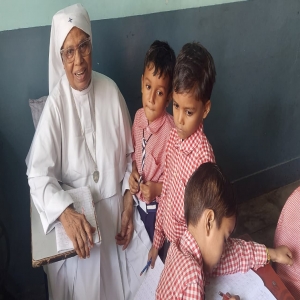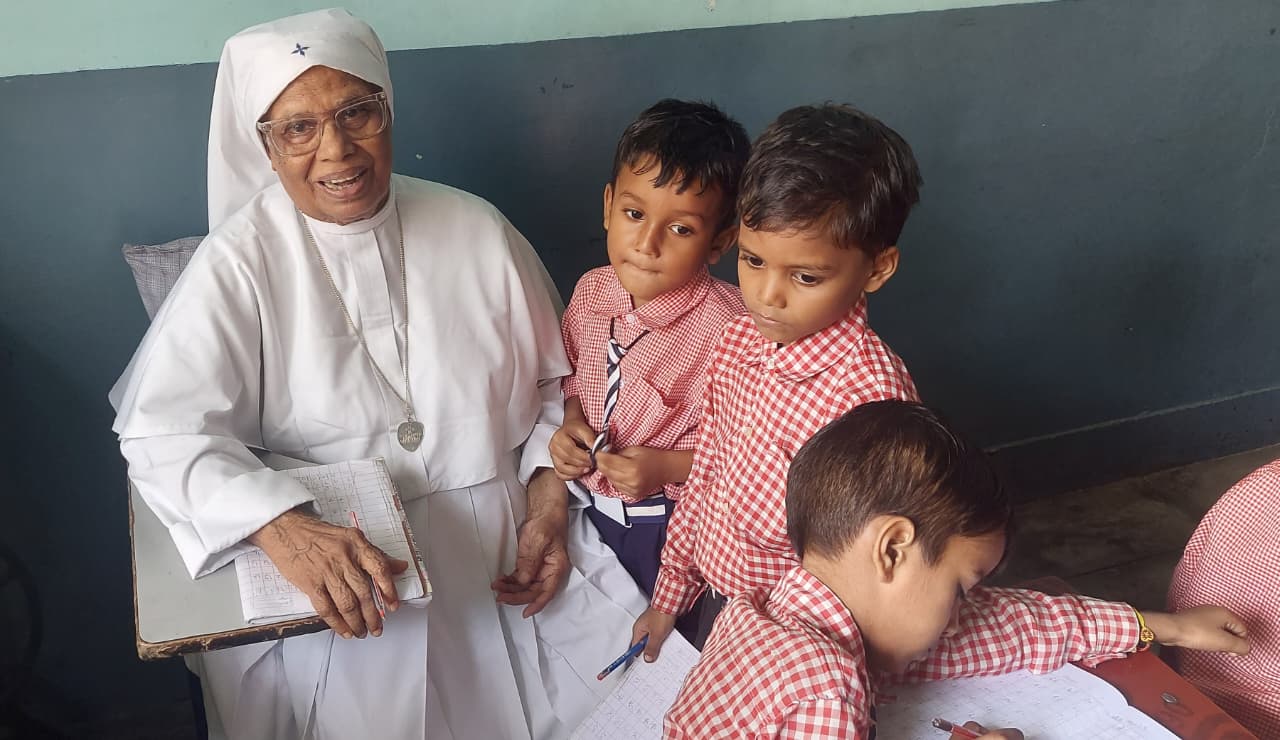

As dawn broke over the busy streets of Muirabad, a little boy named Bikash tugged insistently at his father's shirt, reluctant to climb into the rickshaw. "I want to go to Sister," he exclaimed, his eyes sparkling with yearning. His father, worn from the relentless grind of navigating the city's rough roads, hesitated. For the first time, his son felt valued.
That pivotal moment—23 years ago—signaled the start of a quiet transformation spearheaded by Sr. Amala, a gentle nun from Kerala who chose to leave behind formal teaching for the dusty alleys of a slum.
Now 86, Sr. Amala continues to tread the brick pathways of Muirabad in Prayagraj with the same determination that brought her here over two decades ago—not to receive, but to give.
3 Days on Kochi-Varanasi Express
In 2000, Sr. Amala retired from her teaching position at Home Science College in Angamaly, Kerala. Instead of seizing the opportunity to relax, in 2002, she embarked on a three-day journey aboard the Kochi-Varanasi Express, traveling over 2,700 kilometers in sleeper class, fueled by a desire to immerse herself in the lives of people she had yet to understand.
"I wanted to serve where my efforts were needed the most," she reflects. "Not in comfort, but in close connection."
Upon her arrival at the CSN (Congregation of Sisters of Nazareth) convent in Allahabad (now Prayagraj), she found herself surrounded not by classrooms, but by the harsh realities of poverty: dilapidated shelters, barefoot children, and families struggling to get by. It was within the dust and despair of Muirabad that Sr. Amala discovered her true calling.
The First Child
One rainy morning, a soaked Bikash stood at the convent gate, his father having collapsed from exhaustion while his mother was busy cleaning houses. Sr. Amala welcomed him inside, dried him off, and offered him warm rice gruel. The very next day, he returned with two more children.
"That was the moment," she remembers softly. "When one child feels safe enough to bring in another, that's when trust truly begins."
Children of rickshaw pullers from Muirabad, many hailing from Bihar and Jharkhand, often hesitate to attend school out of fear of being perceived as poor or facing caste discrimination.
From that day forward, the convent courtyard transformed into a classroom. Sr. Amala began teaching the alphabet with a stick on the mud floor, reciting rhymes, and sharing biscuits. A blackboard was mounted on the window, soon followed by slates, notebooks, and storybooks. Gradually, kids began to come—not for grades, but for a sense of belonging.
School of Belonging
Today, Sr. Amala's school serves around 60 students, operating out of a repurposed three-story convent building after the Sisters moved to a new Provincial House nearby. The ground floor hosts the nursery and Class 1, while the first floor accommodates Classes 2 and 3, and the top floor houses Classes 4 and 5. Each space is modest and bustling with the energy of curious children and the attentive care of their teacher.
Even in her late eighties, Sr. Amala walks to school each morning, a short distance away, where she quietly sits in a corner of the ground-floor classroom, correcting notebooks and guiding lessons, always offering words of encouragement.
"We thought she was just another outsider," recalls Ramdeen, a father of four. "But she chose to stay—through the rain, sickness, and silence. That's when we understood—she was truly one of us."
The school invites children from both Hindu and Muslim families. While there are no fees, kids come dressed in bright uniforms stitched by Sisters and volunteers. Their common bond is not religion or caste but a shared belief that every child deserves an opportunity to learn and forge a brighter future.
Informal Learning Beyond Books
Sr. Amala's approach to teaching is grounded in presence and engagement. She employs storytelling, role-playing, songs, and more traditional lessons. Children act out situations that embody honesty, sharing, and bravery, with hygiene lessons woven into their daily routines.
"These children, mostly the offspring of rickshaw pullers from Bihar or Jharkhand, often feel marginalised, making them reluctant to attend regular schools," explains Sr. Amala, holding a beaming child in a vibrant uniform. "Once they receive initial support and are ready, we help them transition into mainstream schools."
During Diwali, the classrooms light up with diyas and marigold garlands, while Amina, a nine-year-old whose father fixes cycle tyres, hums an Eid melody as she paints colorful rangoli. Rohit, once a scrap collector from the footpath, stands tall reciting heartfelt Hindi poetry.
"Sister said Diwali is about dispelling darkness," little Meera says, cradling her clay lamp. "So we made lights for everyone."
Faith in Action
While Sr. Amala's work is deeply rooted in her Christian faith, her dedication cuts across religious lines. She partners with local volunteers and interfaith leaders. Parents, who were once skeptical of her intentions, now regard her as a trusted ally in their community.
"She never asked about our religion," says Salma Begum, Amina's mother. "She asked if my daughter wanted to learn. That was enough."Kanhaiya Lal, Rohit's father, adds, "She treats all children like her own. Hindu or Muslim—it doesn't matter. She sees only their hearts."
Sr Amala also conducts awareness sessions for parents on addiction, domestic violence, and the importance of education. Her approach is gentle but firm, always rooted in dignity. "She is not just a nun," says Meena Devi, mother of three. "She is our Maa."
A Living Parable
Resources are scarce. The school operates on donations, goodwill, and the tireless efforts of a few volunteers, as well as the support of her religious congregation. Sr Amala does not hesitate to beg from friends when she is flooded with endless needs for her children.
Yet, the impact is profound. Children who once wandered about now dream of becoming nurses, teachers, and artists. Parents who once dismissed education now help with homework.
Bikash, the boy who first came to the gate, now drives a Toto—an electric rickshaw bought with a bank loan. On each Diwali, he returns to the convent, inviting Sr Amala for a ride. "She taught us to dream big," he says. "Today, I earn a living because of her." Sr Amala smiles, her eyes twinkling behind her glasses. "I didn't come here to change the world," she says. "I came to hold one child's hand at a time. And somehow, the world changed me."
Legacy of Light
Born as Elsy in Narakkal, on Vypin Island in Kerala, Sr Amala is the fifth of six children of the late Paul and Elishwa Menacherry. In a world divided by faith, Sr Amala's mission offers a different vision—one of quiet, enduring presence extending a helping hand and a thoughtful deed. Sr. Amala's children, though poor, are not neglected of the little joys of seasonal celebrations, such as birthdays, Children's Day, Teacher's Day, Parents' Day, Workers' Day, and festivities like Eid, Diwali, and Christmas.
Her school is a sanctuary of belonging. It is a place where children are not defined by their potential. Where festivals are not about doctrine, but about shared joy.
Sr Amala reminds us that love is the most radical form of justice. And in doing so, she is a living parable—of faith in action, of love as justice, and of one woman's quiet revolution in the heart of a slum.